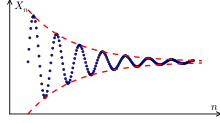Etymology
The word mathematics comes from Ancient Greek máthēma (μάθημα), meaning "that which is learnt", "what one gets to know", hence also "study" and "science". The word came to have the narrower and more technical meaning of "mathematical study" even in Classical times. Its adjective is mathēmatikós (μαθηματικός), meaning "related to learning" or "studious", which likewise further came to mean "mathematical". In particular, mathēmatikḗ tékhnē (μαθηματικὴ τέχνη; Latin: ars mathematica) meant "the mathematical art".
Similarly, one of the two main schools of thought in Pythagoreanism was known as the mathēmatikoi (μαθηματικοί)—which at the time meant "learners" rather than "mathematicians" in the modern sense. The Pythagoreans were likely the first to constrain the use of the word to just the study of arithmetic and geometry. By the time of Aristotle (384–322 BC) this meaning was fully established.
In Latin, and in English until around 1700, the term mathematics more commonly meant "astrology" (or sometimes "astronomy") rather than "mathematics"; the meaning gradually changed to its present one from about 1500 to 1800. This change has resulted in several mistranslations: For example, Saint Augustine's warning that Christians should beware of mathematici, meaning "astrologers", is sometimes mistranslated as a condemnation of mathematicians.
The apparent plural form in English goes back to the Latin neuter plural mathematica (Cicero), based on the Greek plural ta mathēmatiká (τὰ μαθηματικά) and means roughly "all things mathematical", although it is plausible that English borrowed only the adjective mathematic(al) and formed the noun mathematics anew, after the pattern of physics and metaphysics, inherited from Greek. In English, the noun mathematics takes a singular verb. It is often shortened to maths or, in North America, math.












